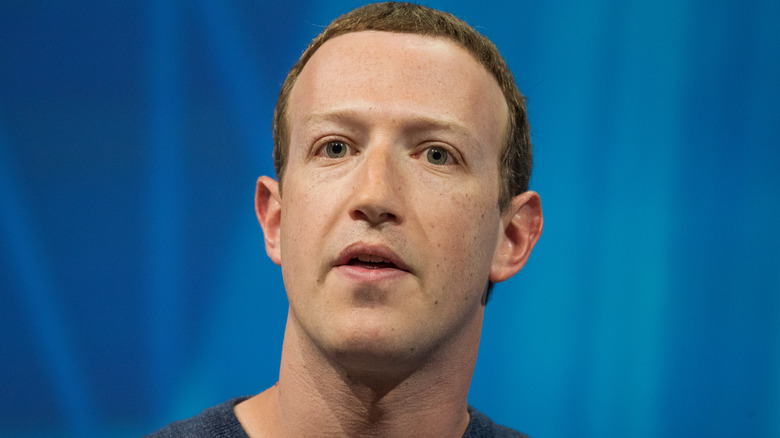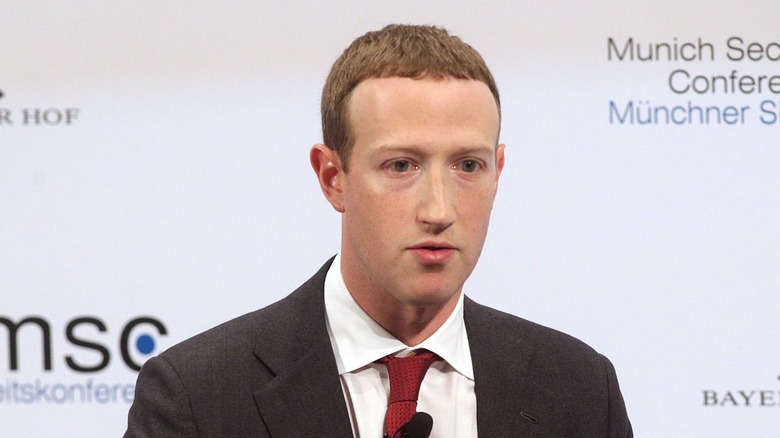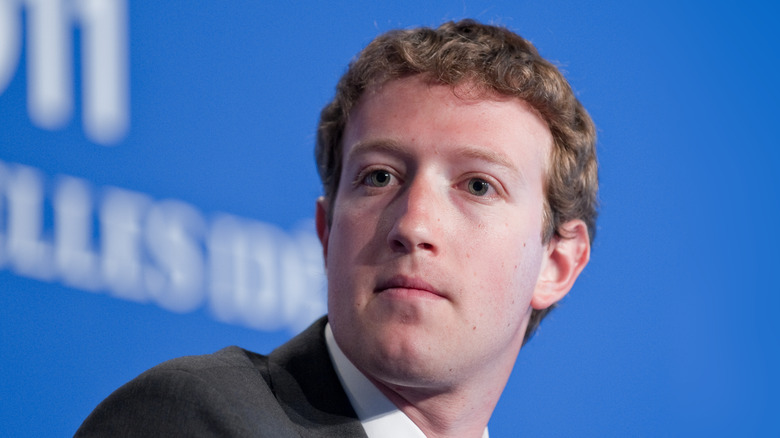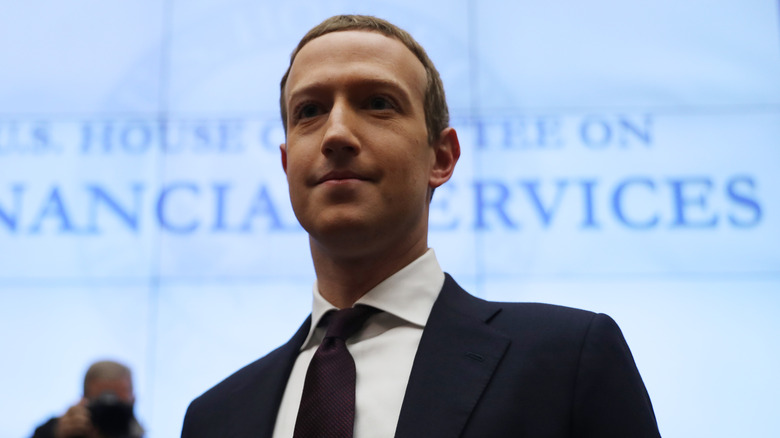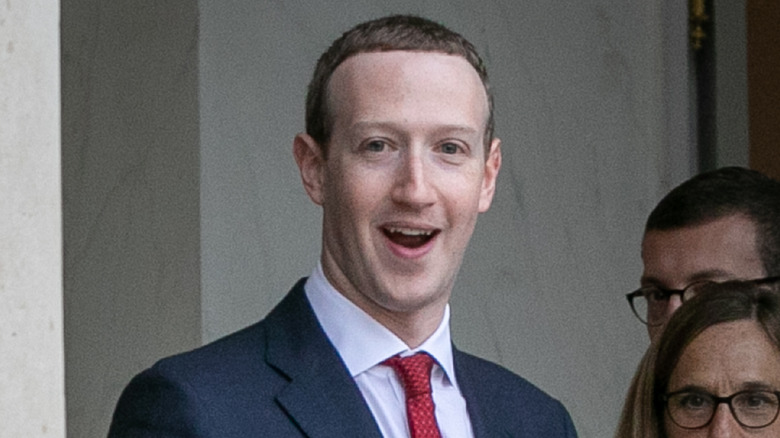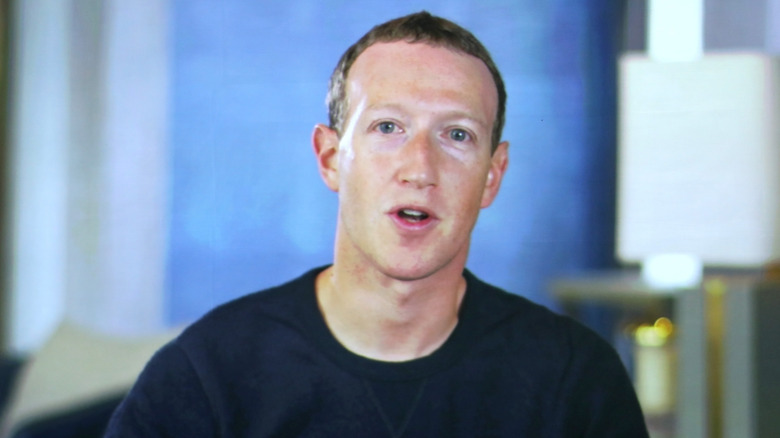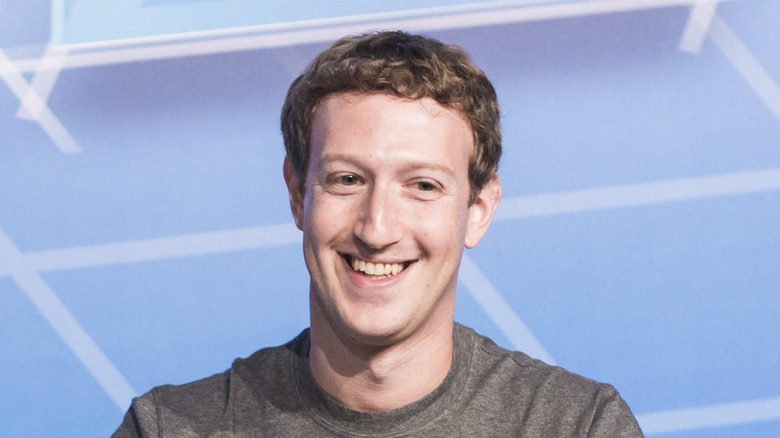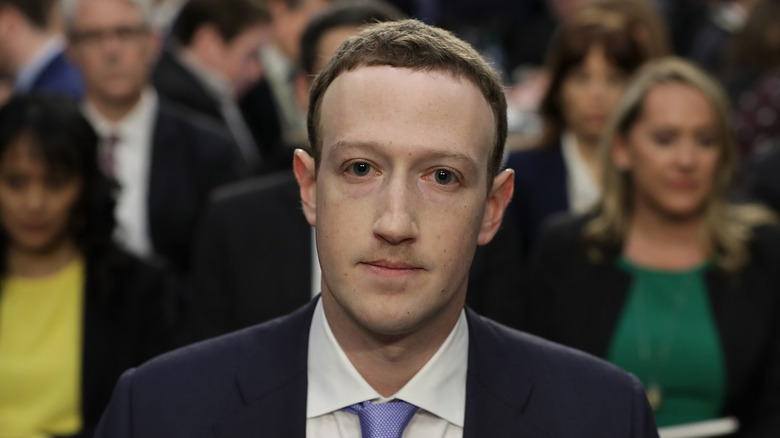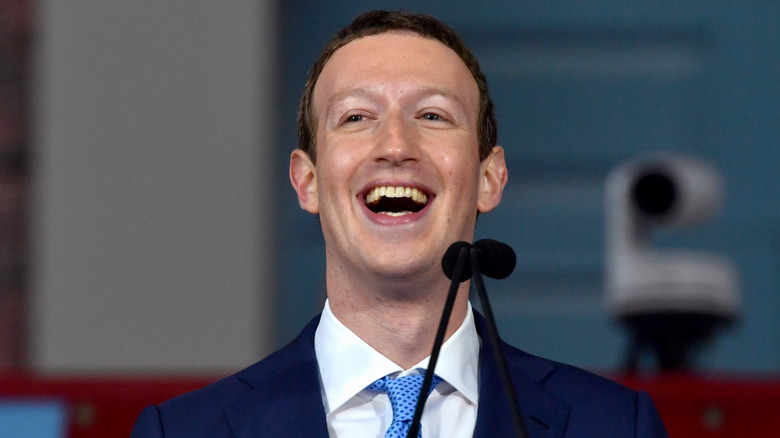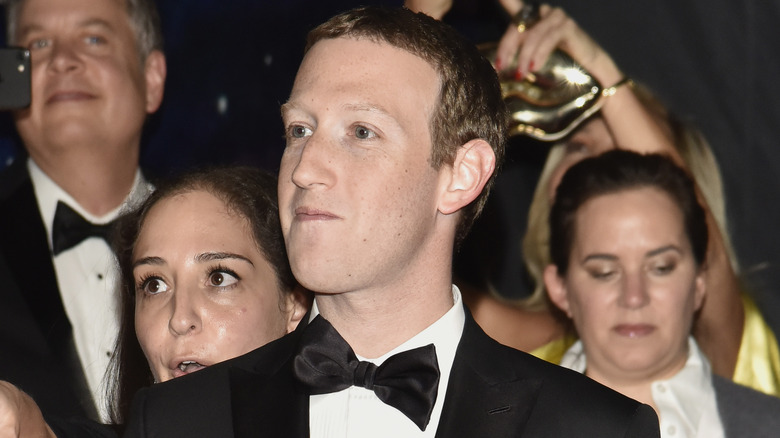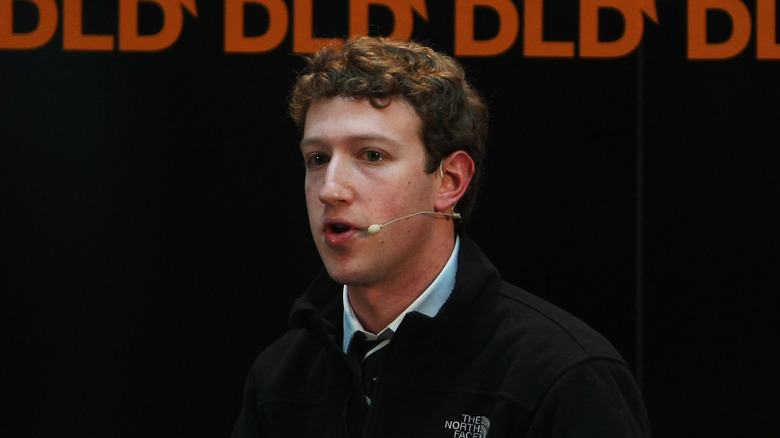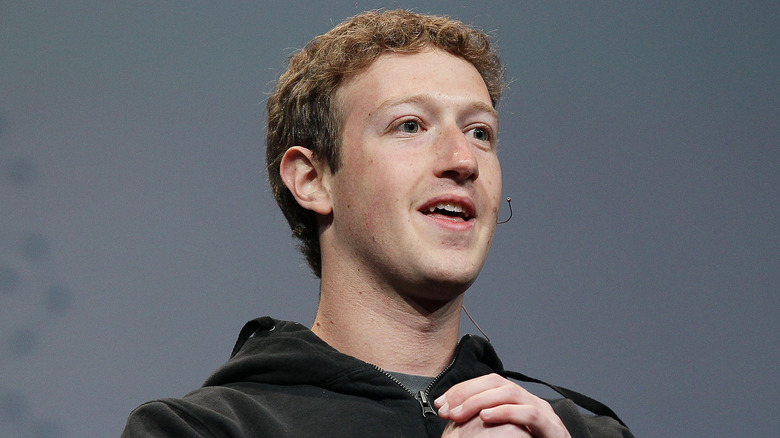The Shady Side Of Mark Zuckerberg
Facebook CEO Mark Zuckerberg is no stranger to controversy, legal trouble, or scrutiny. Although the billionaire might not be the most beloved business owner, he has certainly left his mark on the world. Zuckerberg founded Facebook in 2004, and the social media platform later became Meta. The tech conglomerate owns some of the most popular online platforms in the world, including Instagram and WhatsApp.
While Zuckerberg may have helped shape social media, his own employees are all that impressed. "There's a real culture of 'Even if you are f***ing miserable, you need to act like you love this place,'" a former employee said of their time at Facebook, per CNBC. "It is not OK to act like this is not the best place to work." Some even reportedly compare the workplace environment to a "cult."
Zuckerberg's employees aren't the only demographic who don't appreciate his approach to being a CEO. Keep reading to find out more about the shady side of Mark Zuckerberg.
He sent an angry email to employees
For years, rumors have suggested that Mark Zuckerberg isn't exactly the nicest boss. These rumors were further fueled after a leaked email from 2010 revealed how the CEO communicated with his employees. Zuckerberg sent out an email to Facebook staff after someone allegedly leaked false information about the company's plans to release a phone. In the email, the Meta founder explained they did not actually plan to release a phone. He also made it clear that he wasn't happy with his employee's decision to leak information.
"It is frustrating and destructive that anyone here thought is [sic] was okay to say this to anyone outside the company," Zuckerberg penned in the email (via Fox Business). "This was an act of betrayal. The fact that the story was inaccurate doesn't make it any better. I've had to personally spend a lot of time over the last few days—as have a lot of other people—cleaning up the damage from this mess." He went on to write, "So I'm asking whoever leaked this to resign immediately. If you believe that it's ever appropriate to leak internal information, you should leave. If you don't resign, we will almost certainly find out who you are anyway." As if that wasn't harsh enough, Zuckerberg made the email's subject line "Please Resign."
Mark Zuckerberg was involved in a concerning lawsuit
In March 2023, it was revealed that a number of Meta executives, including Mark Zuckerberg, were being sued by investment funds that owned stock in Meta. They claimed that the tech company does not make enough effort to combat sex trafficking and child exploitation on Instagram and Facebook. Meta released a statement after news of the lawsuit surfaced.
"We prohibit human exploitation and child sexual exploitation in no uncertain terms," they alleged (via Reuters). "The claims in this lawsuit mischaracterize our efforts to combat this type of activity. Our goal is to prevent people who seek to exploit others from using our platform."
This wasn't the first time the company faced disturbing allegations. In 2021, former Facebook employee Frances Haugen came forward to allege that the company doesn't prioritize public safety. "The thing I saw at Facebook over and over again was there were conflicts of interest between what was good for the public and what was good for Facebook," she said during an interview with "60 Minutes" in 2021. "And Facebook, over and over again, chose to optimize for its own interests, like making more money." She also added, "I've seen a bunch of social networks and it was substantially worse at Facebook than anything I'd seen before."
The CEO was questioned by Congress
Mark Zuckerberg had to defend himself and his company in front of Congress in 2018. This hearing took place after it was revealed that Cambridge Analytica collected data from millions of Facebook users without their knowledge, This data was later used to draw conclusions about voters during the 2016 election.
Congress had a long list of questions about Facebook's efforts to protect the privacy of its users. Some politicians questioned how and why Cambridge Analytica had access to personal data. Zuckerberg alleged that the company wasn't honest. "When we learned in 2015 that Cambridge Analytica had bought data from an app developer on Facebook that people had shared it with, we did take action," he claimed (per The Washington Post). "We took down the app, and we demanded that both the app developer and Cambridge Analytica delete and stop using any data that they had. They told us that they did this. In retrospect, it was clearly a mistake to believe them." Zuckerberg was then questioned about why Facebook didn't notify users about the data breach.
Zuckerberg had to defend Facebook in front of Congress once again in 2019. This time, the CEO faced questions about political misinformation and child safety. He was also asked about his plans for Libra, a form of digital currency that was ultimately never launched.
The Facebook founder was sued by Washington D.C.'s attorney general
It seems that Mark Zuckerberg just can't stay out of legal trouble. In 2022, the CEO was sued by Washington D.C. attorney general Karl Racine over the Cambridge Analytica data scandal. "This unprecedented security breach exposed tens of millions of Americans' personal information, and Mr. Zuckerberg's policies enabled a multi-year effort to mislead users about the extent of Facebook's wrongful conduct," Racine said in a statement (via The Guardian). "This lawsuit is not only warranted, but necessary, and sends a message that' corporate leaders, including chief executives, will be held accountable for their actions."
Racine made a number of claims against Zuckerberg in his lawsuit. He alleged that the CEO exposed users to a data breach after he decided to allow Facebook to work with third parties, such as Cambridge Analytica. Racine also filed a lawsuit against Facebook over this same incident in 2018. He was told by a judge that Zuckerberg could not be added to that lawsuit at the time, and the 2022 suit is an another attempt to ensure the CEO is held accountable for the breach.
The FTC fined Facebook $5 billion
The Cambridge Analytica data breach scandal resulted in Facebook being hit with a historic fine. After investigating the data breach, the FTC determined the platform had to pay $5 billion, reportedly the most expensive user privacy penalty a company had ever received at the time. The FTC also decided that Facebook, Instagram, and WhatsApp needed to make a better effort to protect user privacy.
Mark Zuckerberg addressed the FTC's decision in a lengthy Facebook post. "We've formally reached a settlement with the Federal Trade Commission about privacy," he penned. "We've agreed to pay a historic fine, but even more important, we're going to make some major structural changes to how we build products and run this company. We have a responsibility to protect people's privacy. We already work hard to live up to this responsibility, but now we're going to set a completely new standard for our industry." The CEO went on to detail some of the measures Facebook has taken to protect its users.
A lawsuit filed by shareholders in 2021 alleged that Facebook agreed to pay this hefty fine in an attempt to prevent Zuckerberg from being held personally accountable. "The Board has never provided a serious check on Zuckerberg's unfettered authority," one shareholder claimed (via Politico). "Instead, it has enabled him, defended him, and paid billions of dollars from Facebook's corporate coffers to make his problems go away."
He was involved in a 2020 antitrust hearing
Mark Zuckerberg found himself back in front of Congress in 2020 as part of an antitrust investigation, but this time he tuned in virtually, along with a number of other tech CEOs. Some politicians argued that the social media platforms owned by these CEOs censor conservatives. Senator Mazie Hirono of Hawaii wasn't on board with these claims. "I'm really wondering at what point you will stop giving in to baseless claims of anti-conservative bias and start exercising your control over Facebook to stop driving division," she said during the hearing (via Politico).
Political conflict aside, this hearing also led lawmakers to release a report that argued tech companies like Facebook should not have so much power. "Companies that once were scrappy, underdog startups that challenged the status quo have become the kinds of monopolies we last saw in the era of oil barons and railroad tycoons," the report read. These lawmakers criticized the responses of the CEOs questioned during the hearing. "Their answers were often evasive and non-responsive, raising fresh questions about whether they believe they are beyond the reach of democratic oversight," they also penned in the report.
Mark Zuckerberg and Facebook faced criticism for January 6th
Some pointed fingers at Facebook for allegedly failing to put an end to the election misinformation that led to the January 6 attack on the U.S. Capitol. Outlets reported that Facebook did not have the proper systems in place to handle such a situation, so they were stuck trying to combat January 6 as it unfolded.
A few employees expressed their opinions on Facebook's alleged poor handling of misinformation. "How are we expected to ignore when leadership overrides research based policy decisions to better serve people like the groups inciting violence today," one employee wrote on a message board (per Politico). "Rank and file workers have done their part to identify changes to improve our platform but have been actively held back."
Executive director of the consumer watchdog group SumOfUs, Emma Ruby-Sachs, spoke to Business Insider about Facebook's indirect involvement in the spread of political misinformation. "The movement that stormed the Capitol was born out of 'Stop the Steal' – which not only started on Facebook and Twitter but grew, aided by the algorithm that those platforms use to make money," she said.
He tried to buy Musical.ly even though he criticized TikTok
Perhaps unsurprisingly, Mark Zuckerberg doesn't appear to be a fan of his biggest competitor, TikTok, and has even publicly criticized the app before. According to Buzzfeed, Zuckerberg had a lot to say about TikTok during an appearance at Georgetown University in 2019: "While our services like WhatsApp are used by protesters and activists everywhere due to strong encryption and privacy protections, on TikTok, the China-based app growing quickly around the world, mentions of these same protests are censored, even here in the US."
Zuckerberg's statement was brought into question after it was revealed that he actually tried to purchase the lip-syncing app Musical.ly, before it was sold to ByteDance and later became TikTok. Zuckerberg had meetings with Musical.ly's cofounders, but they weren't able to come to an agreement. So, why did the Facebook founder change his opinion on TikTok? One of his ex-employees has a theory. "Facebook is so pissed that TikTok is the one thing they can't beat that they've turned to geopolitical arguments and lawmakers in Washington to fight their fight," an anonymous former Facebook employee told BuzzFeed.
Facebook failed to stop anti-Muslim hate speech
In 2018, Facebook came under fire following anti-Muslim violence in Sri Lanka. The platform reportedly did not step in to properly moderate the hate speech that led to this violence, so the Sri Lankan government had to place a temporary ban on the app. Facebook eventually admitted its wrongdoing in 2020 following an investigation into its handling of anti-Muslim hate speech in Sri Lanka. However, this was only after numerous acts of violence had already taken place.
"We deplore this misuse of our platform," Facebook said following the investigation (via Bloomberg). "We recognize, and apologize for, the very real human rights impacts that resulted." Officials pleaded with Facebook to take action before the violence took place. Sri Lanka's minister of telecommunications and digital infrastructure, Harin Fernando, spoke to BuzzFeed about why the Sri Lankan government eventually had to make the decision to pause the use of Facebook in the country. "[Facebook] would go three or four months before making a response," he explained. "We were upset. In this incident, we had no alternative — we had to stop Facebook."
Facebook conducted an experiment on users without their knowledge
Mark Zuckerberg's name was attached to a bizarre scandal in 2014, when Facebook came forward to reveal an experiment they conducted on users' emotions without their knowledge. As part of this experiment, users were shown either mostly positive or negative content within their feeds, which then had an impact on how often these people posted on Facebook (per the Proceedings of the National Academy of Sciences). The study was conducted in collaboration with Cornell and the University of California researchers.
As you might have guessed, many people weren't happy that Facebook had been conducting secret experiments on them. As reported by the BBC, Adam Kramer, one of the co-authors of the study, issued a statement in response to the backlash. "We felt that it was important to investigate the common worry that seeing friends post positive content leads to people feeling negative or left out," he explained. "At the same time, we were concerned that exposure to friends' negativity might lead people to avoid visiting Facebook." He added, "I can understand why some people have concerns about it, and my co-authors and I are very sorry for the way the paper described the research and any anxiety it caused." This study in part set the tone for public opinion on how Facebook handles user privacy.
Mark Zuckerberg was criticized following Donald Trump's controversial posts
Controversy followed Mark Zuckerberg and Facebook once again in 2020. Former U.S. President Donald Trump took to Facebook to share a post that included the controversial statement, "when the looting starts, the shooting starts," in response to protests after George Floyd was killed in police custody. Civil rights leaders reportedly met with Zuckerberg about his decision to leave the post up on his platform.
"We are disappointed and stunned by Mark's incomprehensible explanations for allowing the Trump posts to remain up," these civil rights groups shared on Twitter. "He did not demonstrate understanding of historic or modern-day voter suppression and he refuses to acknowledge how Facebook is facilitating Trump's call for violence against protesters. Mark is setting a precedent for other voices who would say similar harmful things on Facebook."
Zuckerberg took to Facebook to issue a statement on his decision, and he made it clear that he had no plans to take Trump's post down. However, he did offer an explanation. "I know many people are upset that we've left the President's posts up, but our position is that we should enable as much expression as possible unless it will cause imminent risk of specific harms or dangers spelled out in clear policies," the Facebook founder wrote in part.

